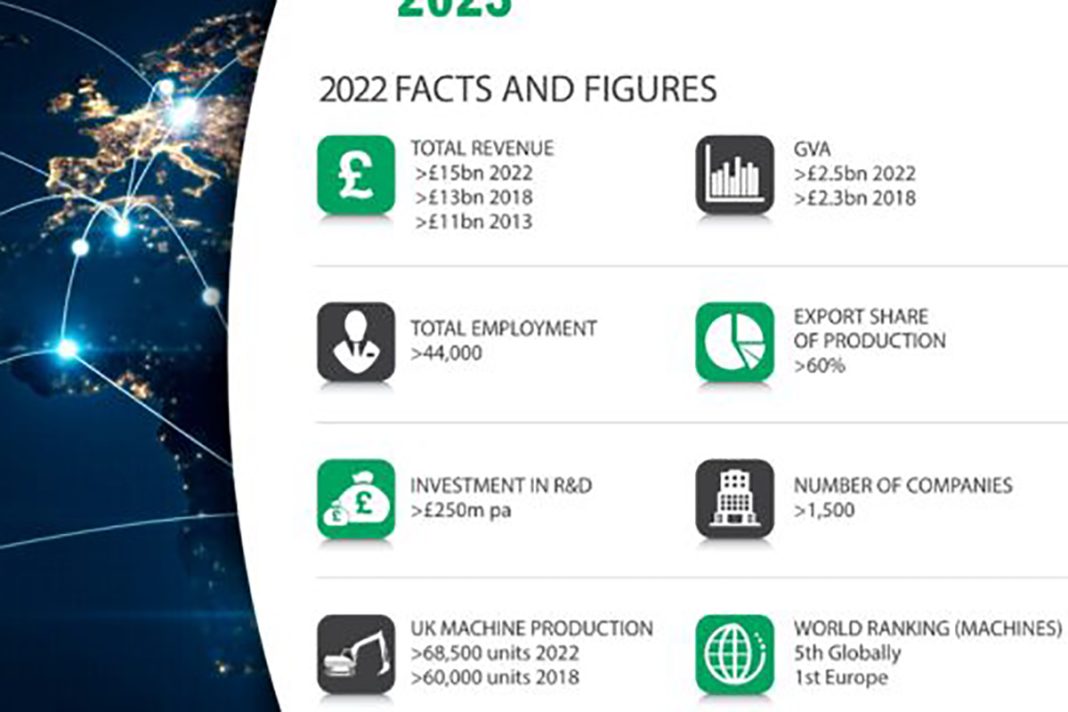![]()
The Construction Equipment Association (CEA) has released the fourth edition of its UK Construction Equipment Sector report for 2023. The report is authored by Knibb Gormezano and partners and contains additional information from Off-Highway Research.
The Construction Equipment Sector plays a pivotal role in the UK economy, not only contributing significantly to employment, with thousands directly employed in manufacturing and many more in supporting sectors, but also in driving the infrastructure growth that underpins national development, ensuring efficient and sustainable construction projects from residential buildings to transport links and energy facilities – it’s an industry that shapes the physical and economic landscape of the nation.
Despite challenges including Brexit, COVID, and supply chain constraints, the sector has shown strong resilience, achieving record-breaking revenues, production volumes, and employment figures.
Key highlights from the report:
- Total Revenue: The sector has seen substantial growth in its total revenue, which has increased to over £15 billion in 2021/2022, from £13 billion in 2018.
- Total Employment: Employment in the sector rose 10% from 40,000 to over 44,000 in the same period.
- Investment in R&D: There is a significant annual investment in Research and Development, amounting to £250 million.
- Gross Value Added (GVA): GVA for the sector has increased from £2.3 billion in 2018 to £2.5 billion in 2022.
- World Ranking in Machines: The UK construction equipment sector ranks 5th globally and 1st in Europe by unit sales.
UK Construction Equipment Sector Report 2023: Remarkable resilience and growth amid significant challenges
The Construction Equipment Association (CEA) is proud to present its latest sector report on the UK construction equipment industry, the first since 2019, a period marked by significant changes such as the UK’s departure from the EU and the impacts of the COVID-19 pandemic.
The Chief Executive of the CEA, Suneeta Johal, applauded the industry’s response to these trials: “Our industry has demonstrated remarkable resilience and adaptability in navigating these challenges, while concurrently grappling with energy, labour, and supply chain related issues. Amid these hurdles, the industry has managed to maintain robust growth throughout the last reporting period in 2021 and into 2022.”
UK Construction Equipment Industry: A tale of growth and resilience
According to the report, the UK’s construction equipment industry has established itself as a global leader. Based on the machines evaluated in the study, the UK industry ranks fifth globally and is the premier leader in Europe by unit sales. Over 1,500 companies, including Original Equipment Manufacturers (OEMs), suppliers, dealers, and other stakeholders, constitute the sector.
In a testament to the industry’s robustness and adaptability, the total revenue experienced a surge to over £14 billion in 2021/2022, up from £13 billion in 2018. The employment figures also showed a positive trend, with a 10% rise from 40,000 to over 44,000, while Gross Value Added (GVA) moved from £2.3 billion to £2.5 billion.
Navigating through a complex landscape: Key trends and challenges in 2023
The construction industry in 2023 is shaped by three significant factors: sustainability, digitalization, and skills development. Other elements such as safety, security, competitiveness, and the formation of strategic partnerships will also wield an impact on all stakeholders. Consequently, the business environment in the construction industry is becoming increasingly complex, demanding meticulous thought and proactive measures to address these various issues effectively.
Digitalisation will act as the cornerstone of improvements, enabling streamlined processes and enhanced efficiency. To ensure the competitiveness of the construction sector, strong partnerships, innovative technologies, and continuous improvement in operational practices will be essential.
Global Construction Equipment Sales: An impressive performance
Global sales data from Off-Highway Research indicates a global increase in the sale of core equipment from 1.17 million units in 2018 to 1.2 million units in 2022, awarding the UK with over a 5% unit share of production. This shows the UK’s crucial role in the global construction equipment industry.
Brexit, COVID-19, and the UK Construction Equipment Sector’s global position
Despite Brexit and the impacts of COVID-19, the UK construction equipment sector has remained a significant net exporter. In 2022, the top five export destinations (the United States, Irish Republic, Germany, France, and Australia) accounted for approximately 51% of total exports, showing an increase from 48% in 2018.
Decarbonisation and the Supply Chain: Investing in the future
The transition to a low-carbon future presents both challenges and opportunities. The UK construction equipment sector needs to invest significantly in developing new capabilities and refining processes. Notably, the areas of powertrain technology, hydraulics, telematics, and human-machine interface technologies are essential for achieving this green transition.
The CEA’s latest sector report was researched and authored by Knibb Gormezano and Partners, with additional information supplied by Off-Highway Research.























